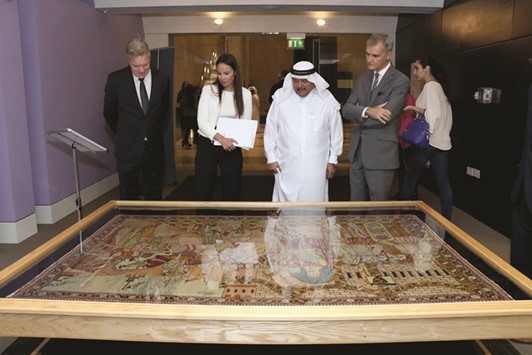It’s been 400 years since the father of modern novel and the great Spanish writer Miguel de Cervantes died. Widely regarded as the greatest writer in the Spanish language and one of the world’s pre-eminent novelists, Cervantes gave the world of literature, Don Quixote, considered a classic of Western literature and ranked amongst the best works of fiction ever written.
His influence on the Spanish language has been so great that the language is often called la lengua de Cervantes, the language of Cervantes. The embassy of Spain in Qatar in co-operation with the Translation and Interpreting Institute of the College of Humanities and Social Sciences at Hamad bin Khalifa University (HBKU) commemorated the 400th death anniversary of Cervantes.
In a ceremony organised recently, Dr Muhsin al-Ramli, a Spanish writer, poet, translator and academic who teaches at Saint Louis University in Madrid, Spain, delivered a lecture on the influence of Islam and the Moorish culture in Cerventes’s work and his masterpiece Don Quixote.
An exhibition of selected items from Cervantes’s period from the private collection of Sheikh Faisal bin Qassim al-Thani was also displayed at the venue. It included a beautiful carpet, two coins, a lamp and a manuscript; all of them having a connection with the period in which Cervantes lived or relate to it.
The exhibition of these fine pieces gave an added value to the Museum which is the lifetime’s work of Sheikh Faisal, by combining the display of these jewels with other arts and providing a historical context to them.
Dr Amal al-Malki, Founding Dean of the College of Humanities and Social Sciences, Ignacio Escobar, ambassador of Spain to Qatar and Sheikh Faisal bin Qassim al-Thani accompanied by two members of his family, along with more than 100 guests attended the lecture.
“The purpose of the event was not only to show to Qatari audience a Muslim legacy to Spanish culture mostly ignored, but also to underline the importance of a cultural event thought and planned by a foreign country together with local institutions and driven by a common interest,” said Escobar, the Spanish ambassador while speaking at the occasion.
This is the reason, he added, why the lecture was given in Arabic and not in English or Spanish, for instance. The lecture attended by a number of local Qatari members of the community was delivered in Arabic with simultaneous interpretation into Spanish and English.
In the lecture, Dr al-Ramli explained in great detail and with examples the Islamic influence on Cervantes and his work Don Quixote.
“Cervantes was captured by Berber pirates when returning to Spain after a battle at sea and was held captive in Algiers for five years. Today you can walk through the avenue that bears his name in the capital of Algeria and even visit the cave where according to the legend, he remained imprisoned,” al-Malki told the audience.
This event gave Cervantes the possibility of knowing first-hand the Islamic and Muslim world that he later presented in his works. Dr al-Ramli pointed out that it is remarkable that Cervantes did not develop an anti-Arab sentiment after being held for so long.
“He tried to escape four times, but to no avail, and was ultimately liberated when a group of monks managed to gather enough money to pay his ransom,” said the academic.
On the contrary, Cervantes wrote two plays around his stay in Algiers where Christians and Muslims interconnect and are subject to the benevolence of Arab leaders. Dr al-Ramli showed to the audience a new perspective in the work of Cervantes since as a scholar of Arabic literature he discovered the existence of elements of many classical literary works in Don Quixote, and many of his works in poetry and novels.
He also revealed that in Don Quixote’s attitude and personality one can find the basic elements of the traditional Arab chivalry. The lecturer also highlighted the fact that the modern Spain we know nowadays still keeps this influence: an open, tolerant and welcoming society that can be a bridge between Europe and the Arab world.
“And, of course, the struggle between Don Quixote, the idealist who runs to support noble causes, and his squire, Sancho, who represents down-to-earth common sense and practicality,” said al-Malki.
The event also provided Translation and Interpreting Institute of the HBKU an opportunity to showcase the quality of their interpretation and language teaching skills, which make the institute a reference for excellence in teaching the Spanish language in Qatar.
Learning Spanish opens the door to a community of more than 500mn persons from all over the world and to one of the greatest cultures in the world. The embassy of Spain took advantage of this opportunity to organise prior to the conference a meeting with many of the Spanish language teachers working in private or public schools.

PIECING THE PAST: Spanish Ambassador Ignacio Escobar (first right), Sheikh Faisal bin Qassim al-Thani (centre) and other guests view the pieces on display.
